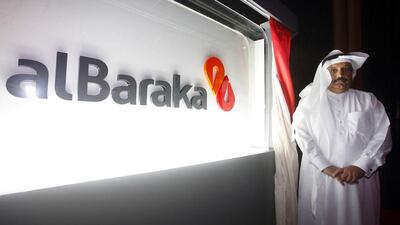Al Baraka Banking Group, a Bahrain-based Sharia-compliant lender, plans to expand its footprint in Asia including India, China and Indonesia and is eyeing bank acquisitions as the coronavirus pandemic pushes valuations down, its chief executive said.
"We always acquire institutions outside [our home market]. This is what we did in Pakistan and this what we are going to do in future. If there is potential then why not – let's acquire," Adnan Yousif, told The National in a phone interview. "I believe the opportunity is there and we should not miss [out]."
Banks across the globe are at risk of reduced profitability as interest rates remain at historic lows and lenders increase their provisions in anticipation of a surge in bad loans. The pandemic, which has tipped the global economy into a recession, slated to be the deepest since the Great Depression, has dented lending, as businesses fold and non-performing loans rise.
Asset quality across the financial industry is under pressure, pushing prices down “not just for me but for everybody … Islamic or non-Islamic banks” who are looking for acquisitions, he said.
There’s no respite in sight in the short to medium term, and Mr Yousif expects valuations to remain low in the coming two to three years as banks will have to continue dealing with bad debts. Some lenders may even require additional capital in the future, offering institutions with stronger balance sheets a chance to pick up stakes.
Asia remains the focus of Al Baraka’s international expansion drive, Mr Yousif said. He, however, did not specify the timeline for entry into China, India or Indonesia, which is home to more than 220 million Muslims.
Al Baraka prefers to secure a banking licence in these markets, as acquisitions are complicated in these jurisdictions. However, if an opportunity to acquire a lender surfaces, the bank “will review it”, he said.
The lender plans to setup a small commercial bank in China focusing on trade financing to capitalise on growing commercial ties between the Asian country and the rest of the Muslim world.
In Indonesia, Al Baraka has already explored the possibility of taking a stake in Bank Muamalat three years ago and will continue to look for further opportunities, Mr Yousif said .
The bank also increased its shareholdings in its Jordanian and Egyptian subsidiaries a few years ago.
Al Baraka currently operates in Sudan, Turkey, South Africa, Algeria, Pakistan, Syria, Tunisia, Saudi Arabia and Lebanon.
Mr Yousif, who is also chairman of the Bahrain Association of Banks, sees the non-performing loans ratio climbing to 8-9 per cent of the total loans portfolio of lenders in the region amid the pandemic. Banks in the GCC, however, have very good capital adequacy levels and buffers to absorb the impact of bad debts, he said.
“We have a buffer of $36 billion (Dh132bn) in the GCC. Now we see central banks have also put flexibility … and I think for the time being central banks won’t insist on high capital adequacy,” Mr Yousif said.
He sees reduced profitability for lenders across the GCC this year and expects it will take at least two years for the banks to come back to pre-crisis profitability level.


